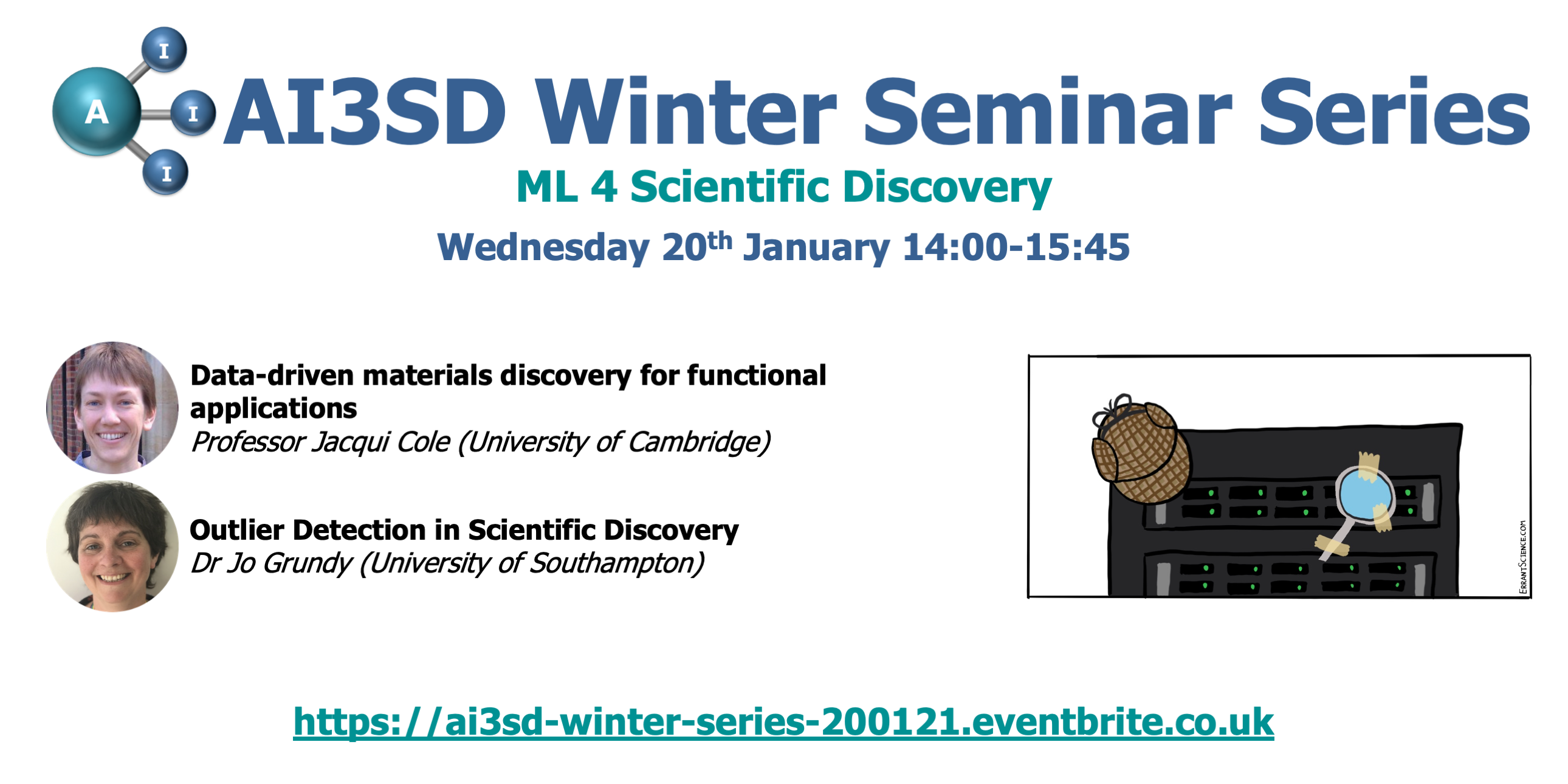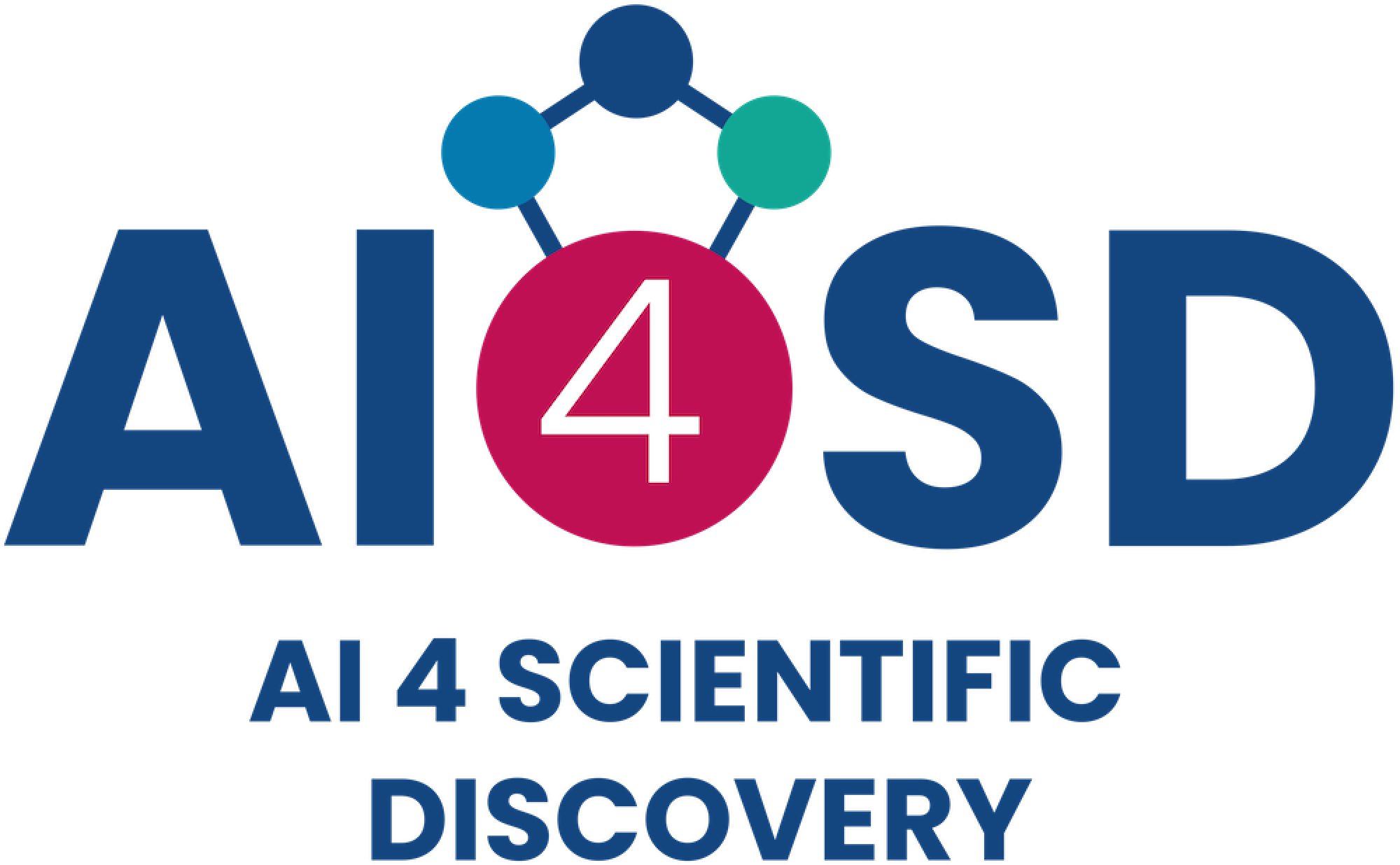
- This event has passed.
20/01/2021 – AI3SD Winter Seminar Series: ML 4 Scientific Discovery
20th January 2021 @ 2:00 pm - 3:45 pm
Free
Eventbrite Link: https://ai3sd-winter-series-200121.eventbrite.co.uk
Description:
This seminar forms part of the AI3SD Online Seminar Series that will run across the winter (from November 2020 to April 2021). This seminar will be run via zoom, when you register on Eventbrite you will receive a zoom registration email alongside your standard Eventbrite registration email. Where speakers have given permission to be recorded, their talks will be made available on our AI3SD YouTube Channel. The theme for this seminar is ML 4 Scientific Discovery.
Agenda
- 14:00-14:45: Data-driven materials discovery for functional applications – Professor Jacqui Cole (University of Cambridge)
- 14:45-15:00: Coffee Break
- 15:00-15:45: Outlier Detection in Scientific Discovery – Dr Jo Grundy (University of Southampton)
Abstracts & Speaker Bios
- Data-driven materials discovery for functional applications – Professor Jacqui Cole: Large-scale data-mining workflows are increasingly able to predict successfully new chemicals that possess a targeted functionality. The success of such materials discovery approaches is nonetheless contingent upon having the right data source to mine, adequate supercomputing facilities and machine-learning workflows to calculate or sample a large range of materials, and algorithms that suitably encode structure-function relationships as datamining workflows which progressively short list data toward the prediction of a lead material for experimental validation. This talk shows how to meet these data-science requirements via ‘chemistry-aware’ natural language processing, image recognition and machine learning developments using case studies to showcase their successful application to data-driven materials discovery.
Bio: Professor Jacqueline Cole holds the Royal Academy of Engineering Research Professorship in Materials Physics at the University of Cambridge, where she is Head of Molecular Engineering. She concurrently holds the BASF / Royal Academy of Engineering Research Chair in Data-driven Molecular Engineering of Functional Materials. This is partly funded by the ISIS neutron and Muon Source, STFC Rutherford Appleton Laboratory, Oxfordshire, UK, with whom she holds a joint appointment. At Cambridge, she carries a joint appointment between the Physics Department (Cavendish Laboratory) and the Department of Chemical Engineering and Biotechnology at Cambridge. She combines artificial intelligence with data science, computational methods and experimental research to afford a ‘design-to-device’ pipeline for data-driven materials discovery. Her research is highly interdisciplinary. Accordingly, she holds two PhDs: one in Physics from the University of Cambridge and one in Chemistry from the University of Durham. - Outlier detection in Scientific Discovery – Dr Jo Grundy: Detecting anomalous readings in data is a problem. Humans are good at some types, for example with images, however machines find it rather more difficult. Detecting anomalies in time series data is even more tricky. Discriminating between data that is part of the same distribution, or caused by some other process is also nontrivial. Anomaly detection is used in a wide range of applications, for example fraud detection for bank accounts, condition monitoring of mechanical systems, and in medical imagery. In all these applications, an outlier is indicative of a problem that requires further attention. A range of outlier detection methods is presented, and tested on a range of synthetic multivariate time series data. A novel method, cyclic regression, is presented and compared to more traditional methods. The application of these methods to real world data is demonstrated.
Bio: Graduated from Exeter University with a BSc in Chemistry in 1996, qualified as a teacher with a PGCE from Durham University then taught at Varndean School for a couple of years in Brighton, before doing an MSc in 1999, then DPhil in Organometallic chemistry at Sussex University. Between 2004 and 2006 I worked with Prof. Mathey at UC Riverside, before coming back to teach at a school in Duisburg Germany. I returned to the UK and taught chemistry and maths to A level, at Farnborough Sixth Form, then the Isle of Wight College, Barton Peveril and Itchen College. In 2018, did a second MSc in Artificial Intelligence at Southampton University, then worked as a Teaching Fellow in Computer Science for a year, before starting in my present job as a Research Fellow in Machine Learning.
